Automobile Club of Southern California
1922 – Sumner P. Hunt and Silas R. Burns
2601 South Figueroa Street – map
Declared: 2/3/71
Predating Triple A by two years, the Automobile Club of Southern California was formed in Los Angeles in 1900. An L.A. Times article from that year reported the club’s first country run “proved successful in every aspect”. A group of eight cars – “automobiles propelled by steam only were used, as the distance was too great for electrics” – took a five-hour drive from L.A. to Ontario on Saturday, the first day of December. While that trip went well, the group had to ford the San Gabriel River in Azusa on its return journey the next day.
From 1914 until it moved into its current headquarters, the Automobile Club occupied the spot above at 1344 South Figueroa, just below Pico, across from where the Staples Center is today.
While the club announced plans for its new home in the beginning of the summer in 1921 (the organization had already owned the land since the year before), it didn’t occupy the site until February, 1923. The three-story, L-shaped Spanish Colonial Revival building was designed by Sumner P. Hunt and Silas R. Burns. Aurele Vermeulen was the landscape architect.
At the time of the new building’s opening, club membership exceeded 56,000.
Upon opening, the basement held the men’s locker rooms and showers, the main floor was for general offices, the second floor was for women’s lockers and restrooms and more general offices, and the third floor was all about the dining room, kitchens, a men’s lounge and smoking room, a large assembly room, and the director’s room.
The West Adams Boulevard side.
Below’s a shot of the club building’s 150,000-square-feet addition, designed by Allison, Rible, Robinson & Ziegler, and built from 1969 to 1970.
A giant Moreton Bay Fig Tree guards the Figueroa entrance to the central courtyard.
The "central patio" or courtyard:
There are a bunch of signs (and an El Camino Real Bell) throughout the club’s compound, like these two – one for the Midland Trail, the other for the Lincoln Highway.
The Midland Trail was the only direct connection between Los Angeles and Salt Lake City. The Lincoln Highway, the "First Road Across America", hooked up with the Midland Trail and headed out to Omaha, Nebraska. The signs date from around 1915.
One thing I did not expect to see at the Automobile Club was a big slice “from a tree called Sequoia gigantean, commonly known as the Big Tree, which fell in Sequoia National Park during 1933. Its measurements are 11 feet 9 inches across the vertical diameter…” It’s figured the tree dates back to 483 A.D.
The way back out to Figueroa:
A couple of shots inside the Automobile Club lobby, including this of the fountain.
The octagonal-shaped lobby’s stretches up to the third floor rotunda.
The Automobile Club of Southern California has a collection of more than 1000 photos and about 100 strip maps at USC’s Digital Archive. However, the two black and white photographs in this post are from the city's Public Library photo collection. This here shot must've been taken while the concrete was still wet.
Sources:
“Enthusiastic “Mobilers.”” Los Angeles Times; Dec 5, 1900, p. I8
“Auto Club Will Build New Home” Los Angeles Times; Jun 26, 1921, p. V1
“Moves to New Building” Los Angeles Times; Feb 11, 1923, p. VI5
Up next: Innes House
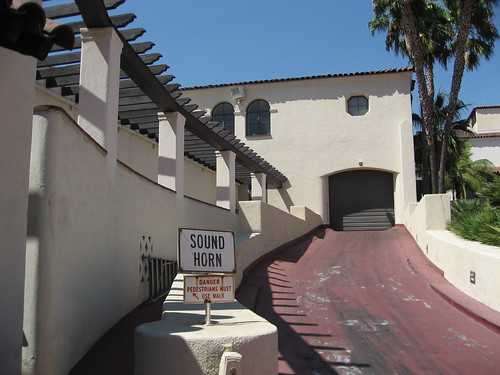

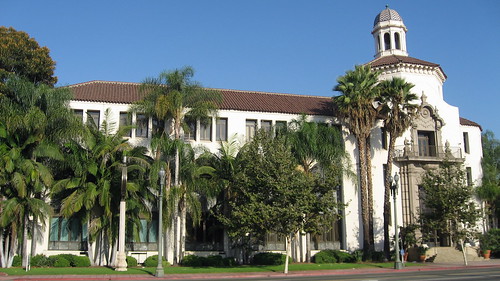
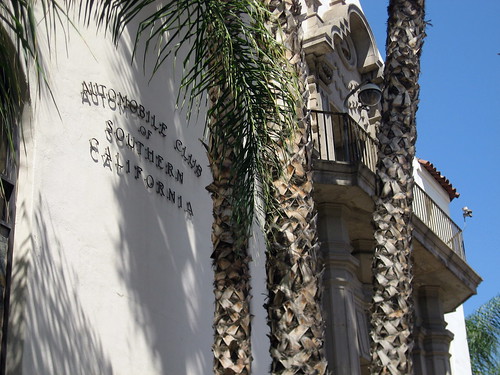
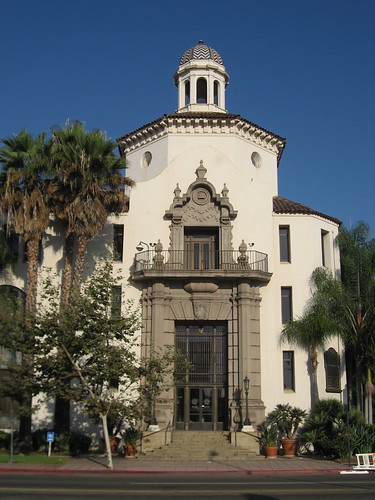
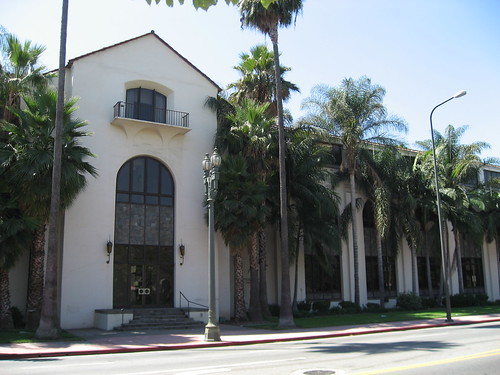
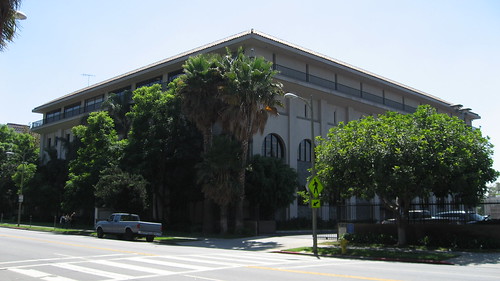
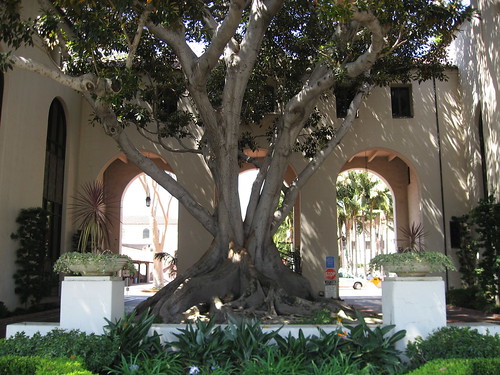
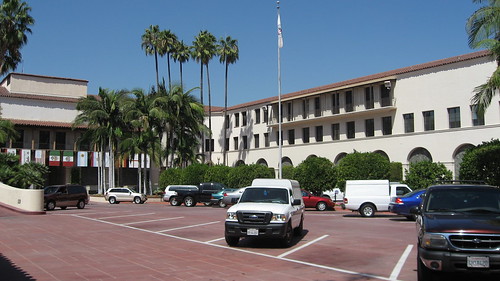
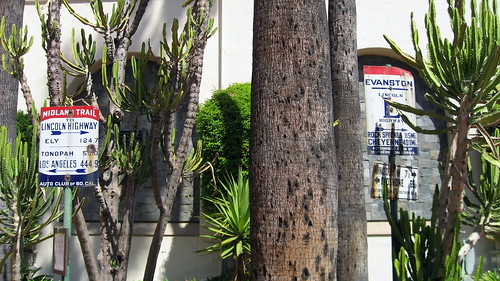
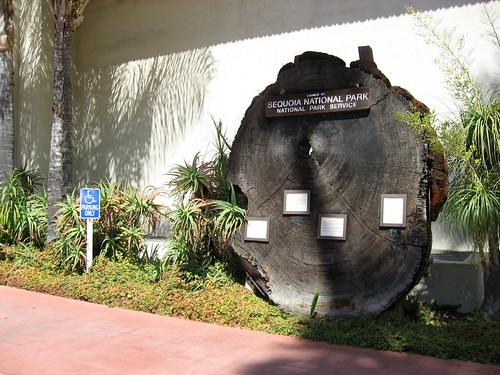
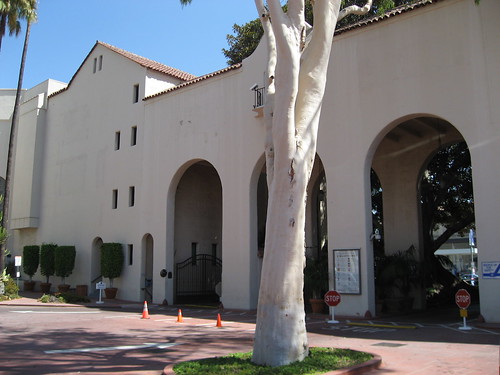
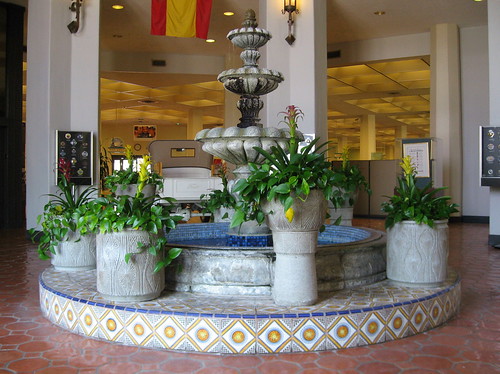
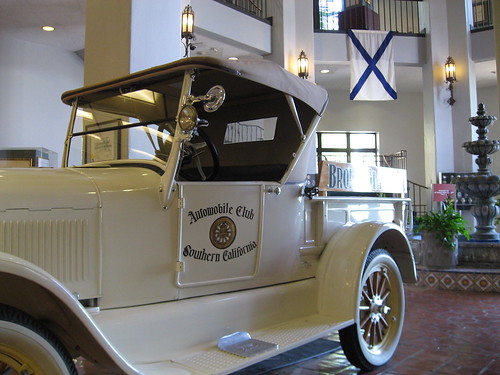
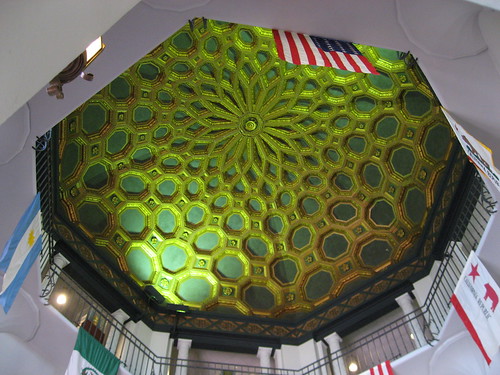



2 comments:
Yet another building I need to check out in LA. I love the interior shots, especially the rotunda.
My Grandfather Tierney started there in the Twenties (I have photos of him fooling around on trucks outside the building), and my father took his job in the late Fifties). They had great family Christmas Parties there and they placed a huge 2-story tree in the rotunda.
My Grandfather and my father were famous there (and I still hear series even recently!) for their hi-jinx. My Grandfather was appropriately featured in an in-house newsletter about the menace of drunk driving on the highways. A half-page photo shows my Grandpa--tousled-hairedd--behind the wheel of car at a police stop with a bottle of 4 Roses on his chest and a policeman looking at him through the car window! My dad would sometimes take my sister and I to work with him on the weekend and we had full run of the building!
Post a Comment